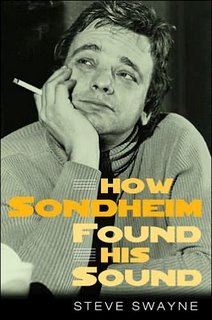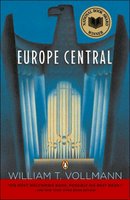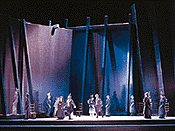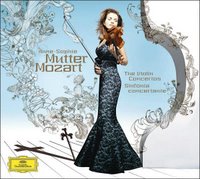
I've done something I almost never do: I stopped reading a book halfway through because I got weary of and frustrated with it. I generally tend keep the faith, believing strongly that the final chapters will offer thrilling conclusions and trenchant insights even if the first chapters do not. But in this case, I decided to abandon the work, a book called
How Sondheim Found His Sound by one Steve Swayne.
From the beginning, this seemed like I book I was destined to love: you have to walk many miles to find a greater admirer of Sondehim than myself (the man who so generously gave me many hours of his time when I was a 20-year-old fledgeling composer, and who dillegenly corresponded with me, fielding what seemed to me then intelligent questions; I can only grimace now. I am certain he's forgotten, but I never will) and this book claimed to get to the root of his very particular, very catholic (note small "c") sound. Even the cover photograph--showing a moony-eyed, wistful looking man of no-doubt 30 years old with requisite mid-1960s cigarette (as opposed to the bearded elder statesman of today)--held promise. Then I began to read...
I do laud the nobility of the exercise: trying to determine the set of influences, circumstances, and collusion of taken-in experiences that led a particular composer to be the artist he is. Borgesian as the undertaking might first appear, it is actually a promising conceit--one destined to fail, of course, because it cannot be done, but points are due for the brio of Swaynes into-the-breach expeditionary spirit.
Examination of multiple strains was promised, commencing with (most excitingly, at least from my perspective) a look at how SS derived much of what he did from classical music, in a chapter called "Sondheim the Classicist." Alas, a more apt title for this first installment might have been "Sondheim the Collector," because this whole section was devoted to charting the master's influence
based on his catalogued collection of albums. One can only blink. I know for a fact that Sondheim is (or was) a collector of old classical LP recordings, but, as anyone who collects knows, to have is not to love, or even to listen, so to say that Sondheim was twice as influenced by Milhaud as by Faure because his collection boasts 15 records by the prior and only 8 by the latter is a downright puzzling assertion. Yet there it is in print for all to see. These figures come not from the text by way of a chart. It will probably nowhere near interest you to know that Sondheim also owns 14 by Bach, a mere 11 by Mozart, 13 by Britten, 12 by Tchaikovsky, 15 by Brahms, 4 by Francaix (though one has gone missing, apparently), 4 recordings of Kennan's
Night Soliloquy, 6 by Falla, 4 by Gershwin, and 17 by Stravinsky. Do your own calculations: Stravinsky was 4.2 times as influential on Sondheim as Gershwin (!) But the 18 recordings of Rachmaninoff versus the 13 by Ravel means that the Russian was 1.38 times as influential as the Frenchman. Yes, of course, Swayne does examine how this bears out in the music, but only just: he speaks of Sondheim under the sway of Strauss, but he is unsure as to which Strauss. For the most part, the cornerstone of his argument rests in Sondheim’s listening. Nowhere does he chart, for example, how many scores SS owns. What of the ticket stubs for concerts, or pieces he himself played at the piano? This is one wooly argument, and as it’s the first chapter in the book, it does not bode well. And assertions like “…one could linger long over Sondheim’s record collection, noting the names of composers and pieces that are virtually unknown to even the most assiduous music historian,” made with an eye to ensuring both the Great Man’s infallibility and his legitimacy (not to mention the depth of his knowledge, lest you think otherwise), smack of loving not wisely but too well. Sondheim’s brilliance is, at this point, indisputable, and much is made of his classical connection by those who really
want Sondheim to be the consummate high/low culture crossover phenom. But why simply make these points based on a (relatively small) catalogue of LPs rather than, say, try to find it in the music itself. Listening is not exactly influence; traditions are not gleaned but absorbed through study, so charting what Sondheim heard is not as important as charting what he studied, what he loved, what he sought to emulate. There’s plenty of Gershwin, Ravel, Falla and Rachmaninoff in his magisterial work for a whole book (someone please write it with lots of side-by-side-by-side musical examples), not just a single, lamentably shallow chapter.
Other chapters are a little more adeptly done: “Sondheim the Tunesmith” examines SS’s more palpable influence of popular songs, and in this case comes with a helpful chart of what was running on Broadway when, allowing you to take in telling simultaneities in a single glance. It’s is amazing to see that
The Rape of Lucretia made its first appearance in the world in the same year as
Love Life, Kiss Me Kate and
Look, Ma, I’m Dancin’. This is invaluable stuff.
In a chapter entitled “Pulling it Apart,” things take a dark turn (and caused yr. blogger to put down the book). This is a bona fide investigation into the music itself, and I stayed with it even though the song under tight examination was none other than Sondheim’s single greatest achievement “What Can You Lose?” from
Dick Tracy. (Read for sarcasm please, because it is certainly there). Why not use, say, “Send in the Clowns” or “The Miller’s Son” or even “Franklin Shepard Inc.” to demonstrate that Sondheim writes in tight little motivic chunks? Yes, this song is textbook, but is also less interesting—and less motivically rife—than so many of his other more memorable tunes.
It was, however, these paragraphs about Bernstein and Sondheim that completely put me off:
Facile comparisons of the two composers overlook a profound difference between them. While Sondheim is a self-confessed harmony man, Bernstein is a rhythm man, and especially in his Broadway shows where dance is so important a component. In contrast, with the exception of Follies, no Sondheim show gives a prominent place to dance, comparatively few are the Sondheim rhythms that rivet themselves to the memory as do Bernstein’s, and rare are the moments where meters change as mercurially in Sondheim’s music as they do in Bernstein’s. Tracing both composers back to Gershwin—as well as to Hindemith and Copland—more logically explains whatever similarities exist in their music than tracing Sondheim back to Bernstein. Such a lineage also does justice to Bernstein’s obvious interpolations of jazz, which find few expressions in Sondheim’s songs. Bernstein and Sondheim took similar things from their compositional precursors, but their individual styles diverged significantly.
Nowhere is this clearer than in the “big finish.” Many of the songs in Bernstein’s musicals, both fast and slow ones, show a predilection for the theatrical flourish, as they build in rhythmic intensity and harmonic complexity to an apotheosis of sheer sound. Bernstein’s choices of musical materials may have made this approach an easier task for him than it was for Sondheim, though knowledge of the two men’s temperaments helps to explain the constant musical exuberance of Bernstein and the relative reticence of Sondheim. Certainly Sondheim knew how to build to a musical climax and has done so again and again. Yet, it is also as if his chastisement by Arlen [where young SS was chided for being too theatrical] stuck deeply. Sondheim’s musical finishes are more succinct and less overwhelming than the almost Mahlerian endings that were Bernstein’s wont. And those “big finishes” are affected by the choices of rhythms; while Sondheim, like Bernstein (and Copland before them), used Latin rhythms, Sondheim tended not to use the more exotic and hypnotic ones that Bernstein favored, instead preferring the tamer ones like the Rumba and bossa nova…
This baffles on so many levels; what, in fact, is it trying to say? Being a semi-academic myself, I will not quibble with the prose (writing about music is about as hard a thing as one can do, so even though I have exacting standards for myself I tend to be forgiving of others' clunkiness) but it is the point with which I take umbrage. Labelling Bernstein a “rhythm man” and Sondheim a “harmony man” is dangerously reductive of both, while explaining that they both have roots (“tracing back” is a funny way to put it when all these composers were writing at the same time, but again that’s picayune of me to mention) in Hindemith and Copland (they “…took similar things”) is a labrythine point which leads nowhere. Saying that Bernstein’s interpolations of jazz were only done justice to in light of his influences is mildly preposterous, as is claiming that Bernstein’s “…choice of materials” made it easier for Bernstein to burn the barn in a finale when Swayne claims in the previous paragraph that their materials were exactly the same.
(The earlier point does bear out, however: SS has catalogued 10 records by Copland and a whopping 17 by Hindemith. putting the latter on equal par with Stravinsky and just behind Chopin and Rachmanninoff viz. the amount of records.)
The passage that got me the most down, however, was not the “apotheosis of sheer sound” (even though that doesn’t work: a “big finish” is totally different than an apotheosis, and “sheer sound” is totally redundant as what is music aside from sound?) but the invocation of the respective temperaments, out of left field, rather than, say, the dramatic situations or the scope of the pieces to explain why Bernstein, more than Sondheim, was inclined to the “big finish.” What about the countless counterexamples—“A Little Priest”, “Epiphany”, “The Ladies Who Lunch”, “Franklin Shepard Inc.”, “There Won’t Be Trumpets”, “Being Alive”, “Another Hundred People”, “Multitudes of Amys”, “The Last Midnight”, “Art Isn’t Easy”, “Finishing the Hat”, “What Would We Do Without You?”, “Comedy Tonight”, “Free”, “I’m Still Here”—showstoppers that would do Bernstein proud to have written, all of which build to the (apparently not so) elusive “big finish.” The idea that Sondheim is all quiet reticent introspection while Bernstein is all flamboyant, over-the-top showman, too often invoked by way of “compare and contrast,” just doesn’t wash in light of the evidence.
Now it may seem like I am doing something I usually resent in a review: isolating a troubled paragraph or clunky sentence and breaking it apart, laying bare its flaws. I certainly hated it when it was done to me in a slightly mean-spirited way on amazon.com. But I am afraid that this sort of thinking—this shuck toward a conclusion (which might be that Sondheim’s sound comes from a lot of sources—but what composers music
doesn’t?)—is rife throughout the book, or at least the 150 or so pages I read. On the one hand, this section (and the whole book for that matter) makes Sondheim seem lacking in that he cannot use the materials of Copland or Gershwin (or jazz for that matter, also not exactly true; think of all those pan-diatonic harmonies, that pastiche of early American song in
Follies), while on the other it makes him out to be too much the innovator, placing him on too high a pedestal, as if he invented things like inner melodies—“contrapuntal harmonies” they are called here—or simple voice leading, an assertion SS himself would no doubt find laughable.
I wanted this book to be good, I really did. These words pain me to write because an investigation into this extremely worthy composer’s particular sound is long overdue. Sadly, it still is.








